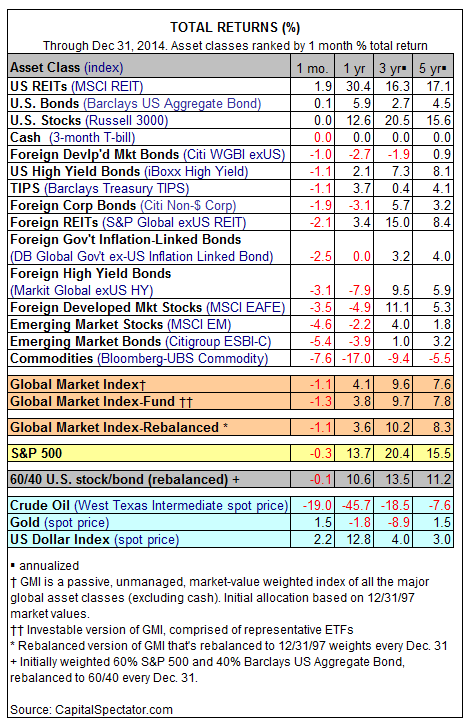Scalper1 News
 U.S. real estate investment trusts (REITs) led the performance race in December among the major asset classes, rising a healthy 1.9% in the final month of 2014, based on the MSCI REIT Index. U.S. REITs were also the top performer for the calendar year among the major asset classes. For the rest of the field, returns in December were mostly flat to negative. The big loser last month and for 2014 as well: commodities, broadly defined (Bloomberg-UBS Commodity Index). The U.S. stock market was flat last month, although for year just passed U.S. equities earned a respectable 12.6% (Russell 3000). That’s a comparatively soft gain relative to the stellar advance for U.S. market in the last few years, but it’s above average in comparison with long-term results. Meanwhile, portfolio diversification faced strong headwinds last month and for 2014 overall. The Global Market Index (an unmanaged benchmark that holds all the major asset classes in market-value weights) retreated 1.1% in December. For all of 2014, GMI earned a relatively soft 4.1% – a sharply lesser gain vs. 2013’s 14.2% advance. GMI’s diminished performance last year is disappointing in the context of recent history, but the downsizing of return isn’t particularly surprising. Forward-looking risk-premia estimates for GMI have been in the neighborhood of 4.0% lately (see last month’s update, for instance). By contrast, GMI’s historical risk premiums have been running at roughly twice that pace in the last several years, based on the trailing three-year period. But as December’s numbers suggest, the wide gap between hefty profits in the rear view mirror and lean expectations for the future is closing. The implication: minting impressive returns with a passively managed multi-asset class strategy is going to get tougher in the foreseeable future. The solution for sidestepping softer results? The standard toolkit, of course – excelling in rebalancing and/or second-guessing Mr. Market’s asset allocation. In other words, generating a portfolio return that’s comparable to what we’ve seen over the past five years will probably require a higher dose of risk. Now that you’ve read this, are you Bullish or Bearish on ? Bullish Bearish Sentiment on ( ) Thanks for sharing your thoughts. Why are you ? Submit & View Results Skip to results » Share this article with a colleague Scalper1 News
U.S. real estate investment trusts (REITs) led the performance race in December among the major asset classes, rising a healthy 1.9% in the final month of 2014, based on the MSCI REIT Index. U.S. REITs were also the top performer for the calendar year among the major asset classes. For the rest of the field, returns in December were mostly flat to negative. The big loser last month and for 2014 as well: commodities, broadly defined (Bloomberg-UBS Commodity Index). The U.S. stock market was flat last month, although for year just passed U.S. equities earned a respectable 12.6% (Russell 3000). That’s a comparatively soft gain relative to the stellar advance for U.S. market in the last few years, but it’s above average in comparison with long-term results. Meanwhile, portfolio diversification faced strong headwinds last month and for 2014 overall. The Global Market Index (an unmanaged benchmark that holds all the major asset classes in market-value weights) retreated 1.1% in December. For all of 2014, GMI earned a relatively soft 4.1% – a sharply lesser gain vs. 2013’s 14.2% advance. GMI’s diminished performance last year is disappointing in the context of recent history, but the downsizing of return isn’t particularly surprising. Forward-looking risk-premia estimates for GMI have been in the neighborhood of 4.0% lately (see last month’s update, for instance). By contrast, GMI’s historical risk premiums have been running at roughly twice that pace in the last several years, based on the trailing three-year period. But as December’s numbers suggest, the wide gap between hefty profits in the rear view mirror and lean expectations for the future is closing. The implication: minting impressive returns with a passively managed multi-asset class strategy is going to get tougher in the foreseeable future. The solution for sidestepping softer results? The standard toolkit, of course – excelling in rebalancing and/or second-guessing Mr. Market’s asset allocation. In other words, generating a portfolio return that’s comparable to what we’ve seen over the past five years will probably require a higher dose of risk. Now that you’ve read this, are you Bullish or Bearish on ? Bullish Bearish Sentiment on ( ) Thanks for sharing your thoughts. Why are you ? Submit & View Results Skip to results » Share this article with a colleague Scalper1 News
Scalper1 News